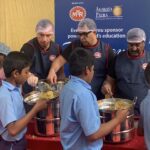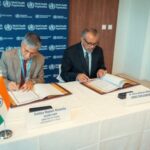Undertake fasting during this period after considering your health and associated conditions such as diabetes
New Delhi, October 12, 2018 : The Heart Care Foundation of India (HCFI) wishes all its readers a very happy navratri. In the Hindu tradition, the process of spiritual Yagna starts from the first day of Navratri on Amavasya and ends up on Diwali, again on Amavasya. The first 10 days involve intense spiritual practice and the rest 20 days entail receiving its benefits.It is imperative for those observing this yagna and a fast to ensure that they do so without harming their health.
The first nine days, called Navratri are devoted to a process of purification and detoxification of mind, body and soul. During this period a person is required to lead a Satwik spiritual life devoting first three days into activities, which reduces negativity in the mind and the body; the next three days he is supposed to indulge in positive behavior and happenings and in the last three days he is supposed to read and learn about spiritual positive things in life.
Speaking about this, Padma Shri Awardee, Dr K K Aggarwal, President, HCFI, said, “Fast does not mean ‘not eating’ but rather controlling the desires and simultaneously cultivating positive mental attitudes. Fast therefore can be of many types. Food fast means controlling the desires for food items which you otherwise may not resist to eat. Eye fast means, not watching things which are Rajsic in nature. Ear fast means avoiding listening to Rajsic (stimulating) music. Action fast means not indulging into activities which stimulates and creates Rajsic thoughts in the mind, and speech fast means not speaking anything evil, etc.After the nine days of self-discipline is complete, the person acquires inner happiness which is nothing but one’s exposure or appointment with the true self or the consciousness (Rama). That is what Dussehra is with killing of Tamas (Kumbhakarana), Rajas (Meghnath) and ego (Ravana).”
Patients with type 1 diabetes should not fast. In general, people living with diabetes should not end fast immediately if their blood sugar level falls below 60 mg.
Adding further, Dr Aggarwal, who is also the Group Editor-in-Chief of IJCP, said, “Navratri is the detoxification of body, mind and soul. Body detoxification involves eating a diet devoid of cereals. Wheat flour is replaced with Kuttu or Singhara flour; pulses with amaranth or Rajgiri and Rice with Samak rice. Kuttu is extremely rich in protein and an excellent substitute for people who are allergic to gluten.”
The Navaratri season will also lead up to the 25th MTNL Perfect Health Mela to be organized between 23rd and 27th October 2018 at the Talkatora Indoor Stadium, New Delhi. The event is a rich amalgamation of education and entertainment and is for everyone from children to professionals.
HCFI tips for fasting
- Plan your diet especially if you have medical conditions such as diabetes and hypertension. Do not skip your medication schedule. Keep a healthy snack handy for those cravings.
- Keep yourself hydrated by drinking water, coconut water, green tea, buttermilk, and lime juice. Avoid aerated drinks.
- Avoid gorging on salty ‘snacks.’ Eat something that is boiled or roasted instead.
- Use rock salt in your food instead of usual salt as it helps in better mineral absorption. It is also beneficial for those who have high or low blood pressure.
- Eat lighter meals as these can aid digestion.
- For dessert, you can try eating dates or fruit yogurt. Also, add honey instead of sugar.
- Eat lots of fresh fruits and vegetables.







